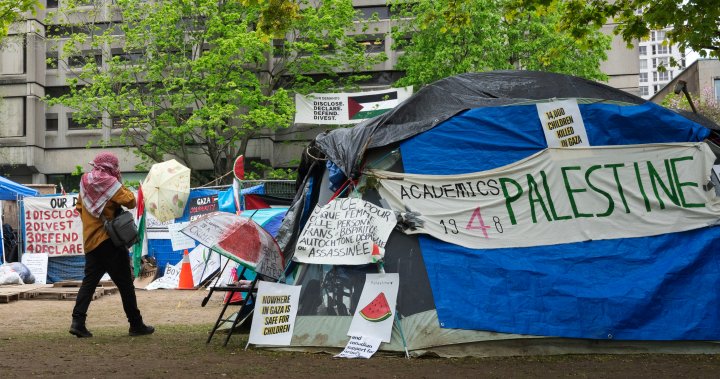A Quebec Superior Court judge recently rejected a request to dismantle an encampment by pro-Palestinian activists at McGill University. The encampment began on April 27 and is situated on McGill’s lower field. The protesters are calling for McGill to divest from companies they believe are complicit in Israel’s occupation of the Palestinian territories and to sever ties with Israeli institutions. McGill filed an application to remove the protesters, citing health and safety concerns and the obstruction of convocation ceremonies on campus. However, lawyers representing the activists argue that there is no evidence of danger posed by the encampment and stress the importance of the right to protest.
This is the second time a Quebec Superior Court judge has considered an injunction related to the McGill encampment. An earlier application for a provisional court order made by two students was also rejected, as they failed to demonstrate that their access to the school was impeded or that they would be unable to write their final exams. The ongoing legal battle highlights the clash between the university’s concerns about safety and order on campus and the activists’ right to protest and advocate for their cause. Both sides are standing their ground, with McGill seeking to remove the encampment and the activists defending their right to demonstrate.
The protests at McGill are part of a broader wave of demonstrations at universities in the United States and Canada in response to the Israel-Hamas conflict. The activists at McGill are part of a movement calling for institutions to cut ties with entities involved in the Israeli occupation of Palestinian territories. The encampment has received public attention and sparked debates about freedom of speech, campus safety, and the university’s responsibility to address political and social issues. McGill’s attempt to remove the protesters through legal means underscores the challenges universities face in balancing academic freedom and student activism.
While McGill’s concerns about health and safety are valid, the activists have raised important issues related to human rights and social justice through their protests. The court’s decision to reject the injunction reflects a recognition of the activists’ right to free expression and assembly. The legal battle between McGill and the protesters may continue, as both sides are unwilling to back down. This case sheds light on the complexities of addressing political activism on college campuses and the need to find a balance between maintaining order and allowing for dissenting voices to be heard. It remains to be seen how the situation at McGill will evolve and whether a resolution can be reached that satisfies both the university and the activists.













